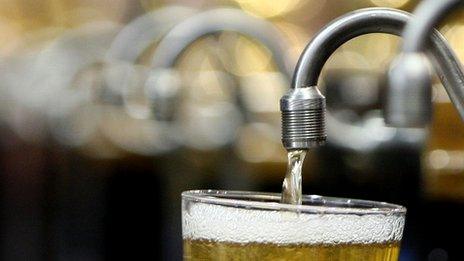Alcohol brands 'pervade' football broadcasts
- Published

The researchers have called for tighter restrictions
Alcohol brands are shown approximately twice per minute during Premier League and Championship football matches in the UK, a study says.
Researchers studied six matches, broadcast on the BBC, ITV and Sky TV in the UK in early 2012, for alcohol brands, seen or heard.
They also looked at conventional advertising.
At the British Science Festival in Newcastle, they called for tighter restrictions.
Currently the alcohol industry has a voluntary code of regulation, set up by the Portman group, but they're not obliged to follow it.
Of 18 hours and 21 minutes of broadcast (the total for the six matches combined), there were 2,042 visual references to alcohol (mainly in the form of beer logos or branding alongside or on the field of play).
There were also 32 verbal mentions of alcohol, which were usually commentators mentioning the alcohol brand sponsoring the event. During all six broadcasts, there were only 17 formal alcohol commercials, making up just 0.6% of the broadcast time.
The matches they picked had a combined UK audience of more than 15 million people, although the researchers acknowledge that some of these may have been the same person watching more than one match.
Brand promotion
Alcohol companies spend £800m a year in the UK promoting their brands, but of this, only £200m is spent on traditional advertising, according to the Institute of Alcohol Studies. The larger proportion is spent on other forms of marketing.
Lead author Dr Jean Adams told BBC News: "I guess I hadn't appreciated quite how pervasive the marketing is. I thought that [where the money was spent] was adverts in shops. I think it's so normal we don't notice it any more, and it took me to stop and count to notice."
She continued: "Alcohol causes such a large range of problems, a range of health problems from sore head the next morning to deadly liver disease.
"It also causes a really wide range of social and, with knock-on effects, economic problems. From things like people who get pregnant when they're drunk because their judgement is diminished to people who lose their family and their jobs because of alcohol," said Dr Adams.
The researchers also pointed out that the guidelines set up by the Portman group state alcohol advertising "should not be targeted at under-18-year-olds".
The charity Alcohol Concern reported in 2010 that up to 5.2 million children between four and 15 years old would have seen alcohol advertising on TV during the 2008 UEFA European Championship.
Dr Adams is concerned about the amount of brand information that is presented outside traditional commercials, as this is often less noticeable, yet still has an effect of biasing people's attention towards alcohol.
"We know that it has an effect, on kids particularly. If we care about protecting our children, we should care about the things that are harming them. So I think we should be worried.
"You stop noticing it, it's become normal. That means these brands are normal to us, we expect to see them in all sorts of walks of life, and so by extension that drinking is just very normal."
When asked whether this kind of marketing might contribute to the ubiquity of alcohol in UK society, Dr Adams responded "I can't believe that it doesn't contribute to it."
Signs of improvement
A spokesman for the Portman Group told BBC News: "National trends around alcohol consumption are encouraging. Government figures show that fewer and fewer children are even trying alcohol and the number of adults that drink to harmful levels is also falling.
"The drinks industry is committed to responsible marketing practices in all forms to help continue these positive national trends." The spokesman declined to specifically respond to these new findings and their implications.
Dr Sally Adams (no relation) is a research psychologist specialising in alcohol studies, from the University of Bath, and was not involved in the study.
She told BBC News: "Alcohol-related cues are often processed outside of an individual's awareness and can stimulate thoughts, memories and expectations of alcohol. In turn these thoughts can lead an individual to seeking out and consuming alcohol.
"In a nutshell, alcohol-related cues can bias our thoughts and behaviours to be targeted towards alcohol and drinking."
The authors believe their findings have implications for the current state of alcohol regulation. First author Andy Graham, a speciality registrar in Public Health, told a press conference at the British Science Festival: "We believe a similar restriction to that imposed on tobacco products may be justified."
Prof Matt Field from the University of Liverpool, also uninvolved in the study, told BBC News: "Not so long ago, tobacco advertising was plastered all over racing cars and snooker venues. That has since been banned and perhaps we need to do the same for alcohol and sport, if it's a way of introducing beer to young people."